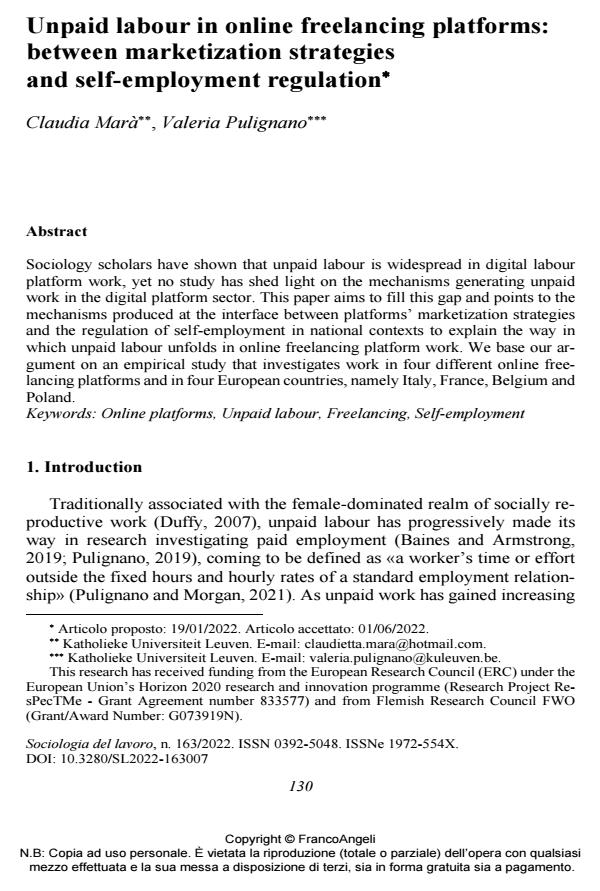Unpaid labour in online freelancing platforms: between marketization strategies and self-employment regulation
Journal title SOCIOLOGIA DEL LAVORO
Author/s Claudia Marà, Valeria Pulignano
Publishing Year 2022 Issue 2022/163
Language English Pages 19 P. 130-148 File size 222 KB
DOI 10.3280/SL2022-163007
DOI is like a bar code for intellectual property: to have more infomation
click here
Below, you can see the article first page
If you want to buy this article in PDF format, you can do it, following the instructions to buy download credits

FrancoAngeli is member of Publishers International Linking Association, Inc (PILA), a not-for-profit association which run the CrossRef service enabling links to and from online scholarly content.
Sociology scholars have shown that unpaid labour is widespread in digital labour platform work, yet no study has shed light on the mechanisms generating unpaid work in the digital platform sector. This paper aims to fill this gap and points to the mechanisms produced at the interface between platforms’ marketization strate-gies and the regulation of self-employment in national contexts to explain the way in which unpaid labour unfolds in online freelancing platform work. We base our argument on an empirical study that investigates work in four different online freelancing platforms and in four European countries, namely Italy, France, Bel-gium and Poland.
Keywords: Online platforms, Unpaid labour, Freelancing, Self-employment
- Capitalism in the Platform Age Federico Chicchi, Marco Marrone, pp.115 (ISBN:978-3-031-49146-7)
- Technology and remuneration of working time: a study on paid and unpaid working time in platform work Mariana Fernández Massi, Julieta Longo, in Cambridge Journal of Economics /2024 pp.151
DOI: 10.1093/cje/bead041 - Platform Work as a Source of Satisfaction – Its Merits and Demerits in the Opinion of Poles Izabela Ostoj, in Studia Sieci Uniwersytetów Pogranicza /2023 pp.187
DOI: 10.15290/sup.2023.07.11 - Platforms Don’t Care – Qualified and Experienced Women Do: A Case Study on Self-Employment and On-Demand Platforms in Eldercare Franziska Baum, in Critical Sociology 08969205241304281/2024
DOI: 10.1177/08969205241304281 - Quality of working life in remote platform work: a systematic review of a fragmented field of research Claudia Marà, Lander Vermeerbergen, Valeria Pulignano, Karin Hannes, in Employee Relations: The International Journal /2025 pp.1
DOI: 10.1108/ER-06-2023-0302 - 2025 International Conference on Data Science, Agents & Artificial Intelligence (ICDSAAI) Kandavel N, Leena H, Swetha V, R. Gowri, Zahid Hussain J, Yogapriya M, pp.1 (DOI:10.1109/ICDSAAI65575.2025.11011794)
-
‘If we lower our responsiveness, the algorithm likes us less’
. A biographical perspective on (losing) control in the platform economy
Mê-Linh Riemann, Claudia Marà, Markieta Domecka, Valeria Pulignano, in Labour and Industry /2024 pp.155
DOI: 10.1080/10301763.2023.2252609
Claudia Marà, Valeria Pulignano, Unpaid labour in online freelancing platforms: between marketization strategies and self-employment regulation in "SOCIOLOGIA DEL LAVORO " 163/2022, pp 130-148, DOI: 10.3280/SL2022-163007